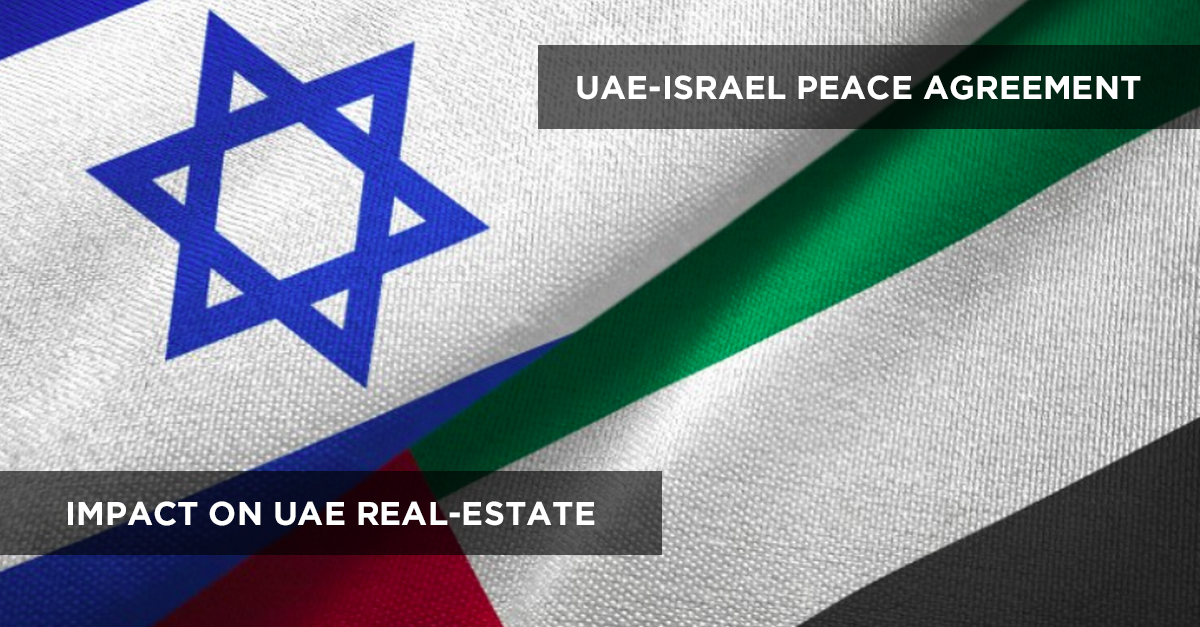UAE-Israel peace agreement: Impact on UAE real-estate
The United Arab Emirates and Israel agreed to normalize the diplomatic relations in a historic peace deal, signed earlier this month. The UAE became only the third Arab country to enter into an alliance with Israel, and the agreement is likely to be the basis for a huge economic opportunity for both nations. This new relationship has opened doors for successful business collaboration, trade and investment in previously inaccessible markets, including the region’s real-estate and property sector.
Beyond the promise of lasting peace, the importance of the UAE-Israel deal lies in the creation of a thriving regional economy that promotes shared prosperity. This landmark agreement will allow Israel and the UAE to diversify their investments in the each other’s economies, unlocking the potential for future growth. The subdued real estate markets of the recent past are reacting to the announcement with hopes of resurgence, and property sales in the region are already reflecting this positive sentiment.
The timing of the peace agreement is also just right for it to create a positive impact. Here’s why.
Israeli investors are keen to invest in the current buyer’s market
According to market reports summing up Q2 2020, average apartment prices in Dubai fell by 2.6% in comparison to Q1, a greater rate of decline than in the previous quarter, when the COVID crisis first began. While average villa prices experienced a relatively moderate fall of 1.2% for the quarter, average rents fell comparatively sharply, with a decline of 3.9%[1].
However, with these favourable prices and lower rents across the UAE acting as a catalyst, industry watchers are predicting a steady resurgence in the region’s real estate sector. A recent survey, assessing the impact of COVID-19 on the Dubai residential property market, confirmed this growing demand. It identified the aspirational purchase of properties, which were previously beyond the buyer’s budget, as the major reason for a stable growth in the number of transactions[2].
The UAE’s reputation as a global and regional hotspot for luxury real estate has drawn international investors in droves, for decades. What might prove to be a clincher for Israeli investors is the relative proximity, in conjunction with the excellent value that the Emirati real estate market offers buyers and investors, in comparison with many other global hubs. The UAE’s excellent infrastructure has already led to scores of multi-national corporations locating their regional offices in the nation, and this thriving ecosystem will be of interest to businesses from Israel as well. According to Khaleej times, Israeli investors have been looking at property in the UAE with a great deal of interest, ever since meetings leading to the resumption of diplomatic ties began[3].
A relationship with great potential for mutual benefit
The UAE has emerged as a global hub, which connects the Arabian Peninsula with the rest of the world. Out of the nine million residents in the nation, about eight million are expatriates. Although the vast majority of this immigrant population consists of working professionals, the UAE’s policy focus on diversifying its economy means that it will continue to require an influx of professionals and businesses, in almost every sector. Although it is not yet clear if Israelis will get the necessary permits to work in the UAE, there are obvious opportunities for an eventual influx in the oil industry, tourism and real-estate sector.
For its part, the UAE will benefit from the start-up culture, R&D and technological innovation, which Israel is known for. The combination of the vibrant Israeli Proptech sector(2), and the Emirati real estate industry’s appetite for breakthrough technologies, is likely to drive tremendous business activity. A new stream of investors from Israel is expected to help ease the glut in real estate building stock in the UAE. The expansion of specialized properties, especially in the hospitality sector, is also likely to get a shot in the arm, with an influx of Israeli tourists.
A new chapter in the new normal
The UAE is currently one the most progressive and future oriented economies in the world. As a market, it is represents the perfect combination of farsighted and supportive administrative policies, a dynamic business community, and a location that makes it the ideal hub to connect nations across three continents. Its diverse expatriate population makes the UAE an extremely inclusive landscape for businesses to invest in, and its cities already host the offices of market leaders in most industrial sectors.
These intrinsic strengths are reflected in the interest that the UAE real estate sector attracts, from investors all over the world. The UAE-Israel peace deal has opened the doors for free cooperation between the business communities of the two nations. The UAE real estate market will be a beneficiary of this move, through an immediate influx of new capital, as well as the long term collaboration between the two most innovation driven markets in the Middle East.
- https://www.chestertons.com/en-gb/news/global-market-insight/dubai-market-report-q2-2020
- https://www.zawya.com/mena/en/wealth/story/Buying_renting_a_house_Top_trends_in_Dubais_postpandemic_residential_market-ZAWYA20200901121854/
- https://www.khaleejtimes.com/business/local/kt-exclusive-israeli-investors-eye-uae-property-deals-
- https://www.propmodo.com/how-israel-the-startup-nation-has-the-potential-to-disrupt-the-proptech-industry/




